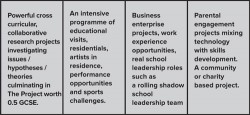We want all children (especially those who are underachieving) to develop the habits of the best learners – self-motivation, resilience, perseverance, optimism, critical thinking, communication skills, and risk taking – that equip them for success. We want young, British people to leave school ready and eager to thrive in a competitive global workplace and adapt to a rapidly changing world with energy and determination.
The argument is about how we get there. Consider:
• Has our present complex exam system with all its testing and where students take up to 14 subjects delivered the above?
• Will a return to a three- hour end of course exam in core subjects for selected students deliver the above for all our youngsters?
• Are other countries returning to the type of exams sat 40 years ago by their out-of-touch politicians or are they focusing on how to develop 21st century learning skills?
Outstanding teaching, even as described by Ofsted, is about promoting 'high levels of resilience, confidence and independence when they (pupils) tackle challenging activities'. The very highest order thinking skills involve evaluating, imagining, hypothesising, reflecting and predicting – not learning by rote. The exam system needs to focus on testing and proving whether or not schools, in 11 years of compulsory education, have actually delivered students who are better thinkers, creators, self-managers and communicators. We need an assessment system fit for the purpose of delivering for all children the highest quality skills, and knowledge that isn't forgotten as soon as they walk out of the exam hall.

In all my training experience in hundreds of schools, many teachers tell me that most youngsters in who in Year 7 came as enthusiastic, motivated, independent learners have learnt to be passive and spoon fed by 16. That is what our examination system has delivered – because in secondary education nearly all the focus is on the tyranny of the external assessment.
Take English. The highly prescriptive literacy hour strategy failed to deliver and now there is a sharp focus by Ofsted on literacy from primary to secondary. But can an exam really prepare a child for life outside the exam hall, and measure whether he or she can (and will) use these reading, writing and speaking skills in the workplace and at home, in the real world? Many Year 9 children are still being taught the same stuff they learnt in Year 4 – sentences, paragraphs, engaging vocabulary and subordinate clauses. No wonder they coast, get bored and turn off learning. Ask Year 7 or 8 learners how many of them are repeating maths stuff they did in primary school. The KS3 curriculum does not deliver enough challenge and progression and my experience working in primary and secondary sectors in the last few years has reinforced my view that we are not cashing in on the amazing capacity of youngsters to make astounding progress in learning, thinking and growing during this stage. It's too late by year 10 to discover that kids who came in on level 4 are now only just creeping into level 5 (even if you believe cognitive development can be measured in anything as crude as levels in the first place). If you want 'three levels of progress', you need to start on day one of Year 7.
• Visit / film / gather work examples from good primary lessons to show your teachers how high their expectations should be.
• Plough all your brilliant teachers into KS3 instead of saving them for exam classes.
• Redesign your KS3 curriculum to provide more challenge, eg:
Schools are already getting excited about what they can do with the curriculum at KS3. At Clevedon School this term has begun with an explosion for Year 9 as their exciting collaboration between the English, history and art departments had the students really experiencing the impact of the Second World War as staff dressed in fatigues and a tank arrived in the playground (see David Didau's blog as The Learning Spy for more information)!

As you motivate and drive your young learners on from day one, you may realise that conventional testing at 16 only has the purpose of providing some kind of measuring stick with which to beat schools. And that stick would be better used at 18 or even at 21 ,when we can really see the impact of education on the hopes and dreams of our youth.
About the expert
ackie Beere OBE is a teacher trainer, advanced skills teacher, former secondary head teacher, school improvement partner, and author of The Perfect (Ofsted) Lesson (revised and updated version due 11th October), The Perfect Ofsted Inspection, The Learners Toolkit and creating The Learning School.










